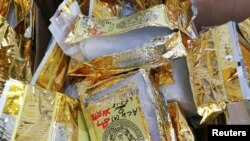Given the estimated $70 billion being made each year in Asia’s drug trade, regional experts say recent arrests of two key drug figures are seen as unlikely to dent the long-term flow of narcotics.
Dutch police said in January they had arrested Tse Chi Lop, allegedly the leader of the Asian drug syndicate known as The Company or Sam Gor (Brother No. 3 in Cantonese). It is alleged to have made tens of billions of dollars each year off drugs in the region.
Then in February, it was announced that Lee Chung Chak, suspected of being a second leader of the syndicate, had been arrested.
The syndicate’s cash cow is methamphetamine, produced in laboratories in the Golden Triangle, straddling Myanmar, Laos, Thailand and China, for the Australian, Japanese and Taiwanese markets.
The arrests “might temporarily disrupt the clientele they were working with and the networks they work with, but the reality is that the demand has been built,” Jeremy Douglas, regional representative of the United Nations Office on Drugs and Crime told VOA news February 8, saying seizures have been surging over the last few years, reflecting the vast supply.
The UNODC estimates that Sam Gor may control as much as 40% to 70% of the methamphetamine market, sending the drug out in tea packets — a branding device indicating high quality.
“Someone will assume a role within Sam Gor, or other big players are going to come in and say, that opportunity is too big for me to pass up. I’m taking it… I’m going to seize the day and go for it,” Douglas said.
Meth men
Methamphetamine comes in two forms in Southeast Asia. The first is small “yaba” (“crazy medicine” in Thai) pills, which are cut with caffeine and now go for as little as 30 cents a pill in Thailand’s border areas. Cheap and abundant it has long been a favorite high of Southeast Asian laborers, truck drivers and clubbers.
"Ice” — or crystal meth — though, is more addictive and damaging.
The price of a gram has also plummeted in the countries nearest to the production sites as drug lords flood the market in their product. In Thailand a gram now costs as little as $26, nearly 40% cheaper than the price a few years ago.
By the time it is smuggled to Australia, ice commands a higher price. Use of it there it has reached epidemic levels. Government statistics released in December say the drug carried an annual social cost of around $4 billion to the economy in 2014 and 2015, while four times more people are dying from use than did so a decade ago.
In late 2019, Australian border police intercepted 1.8 metric tons of ice, with a street value of around $800 million stuffed in the Sam Gor’s signature tea packets, hidden inside stereo speakers on a cargo ship off the Melbourne coast. It had been shipped from Thailand.
The Australian Federal Police has led the global police response to the Sam Gor.
The syndicate is believed to have emerged from a union of several former rival triad groups — the 14K, Wo Shing Wo and Sun Yee On — from Hong Kong and Macau. They pulled in a coalition of partners, from the Myanmar-based ethnic militias — whose product can be made secretly inside the Golden Triangle — to Thai gangs that transport it and Australian bikers and Japanese Yakuza who get it on the streets.
Thai police arrested Lee in October in the Luangsuan area, an upmarket Bangkok neighborhood, acting on a warrant issued by Australia, which is seeking his extradition. Lee is believed to be the logistics maestro for The Company, with contacts that opened borders.
For around a decade Lee and Tse “used Thailand as a meeting point because it is close to the Golden Triangle production site,” a police source told VOA, requesting anonymity.
“Most of the negotiations are done here,” he said.
There has been a disruption to the large shipments of drugs to Australia since the arrests, according to Montree Yimyam, commissioner of Thailand’s Narcotics Suppression Bureau.
“But when the heads are cut off there’ll always be someone rising to take their place and demand in Australia remains the same, so it’s still business as usual for the drug trade,” he told VOA.
Secrets to be spilled
Thailand plays a key role in the drug trade. Its borders with Myanmar and Laos are vast and open, enabling easy transport into the kingdom, where large shipments are stored for onward movement through ports, road and rail links.
Thai drug police are hunting another member of the The Company: Arsue Songkittikul, a 48-year-old with Myanmar and Thai passports and who goes by several aliases, the police source said..
Arsue is wanted in Myanmar over a 1.7-metric-ton seizure of ice in 2016 and Thai police believe he procured drugs for the Sam Gor syndicate.
Regional law enforcement authorities are desperate to see what intelligence the arrests of Tse Chi Lop and Lee will yield, especially on a money trail that launders billions in illicit cash through casinos, condos and cryptocurrency.
In contrast to their Latin American peers who covet the limelight with their notoriously flashy lifestyles — and make headlines with extreme violence, Asia’s drug kingpins “in a sense, stay in the shadows,” according to the UNODC’s Douglas.
“Asian groups function less as a hierarchy — like you see with the Latin Americans — and more as a network of common interests. In other words, make profits, keep your profile low and spread the talent around,” he added.






